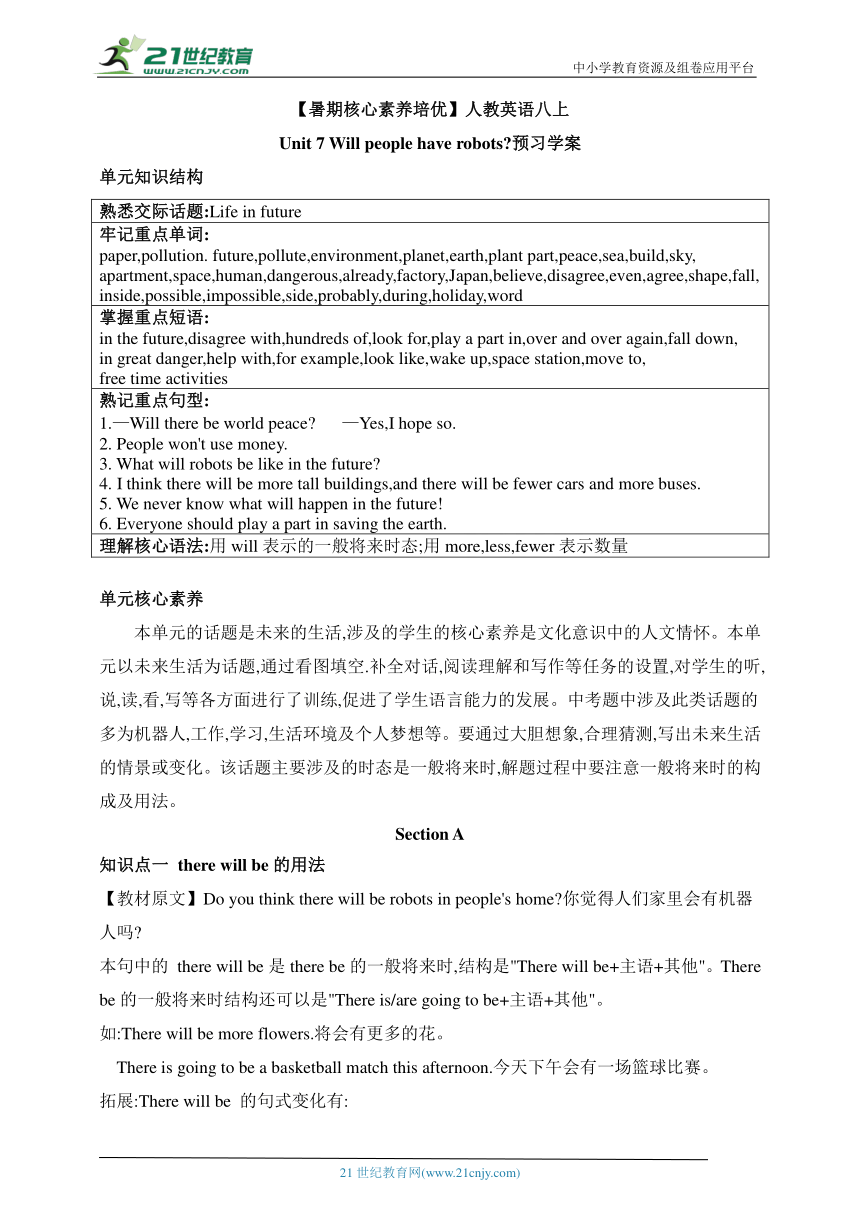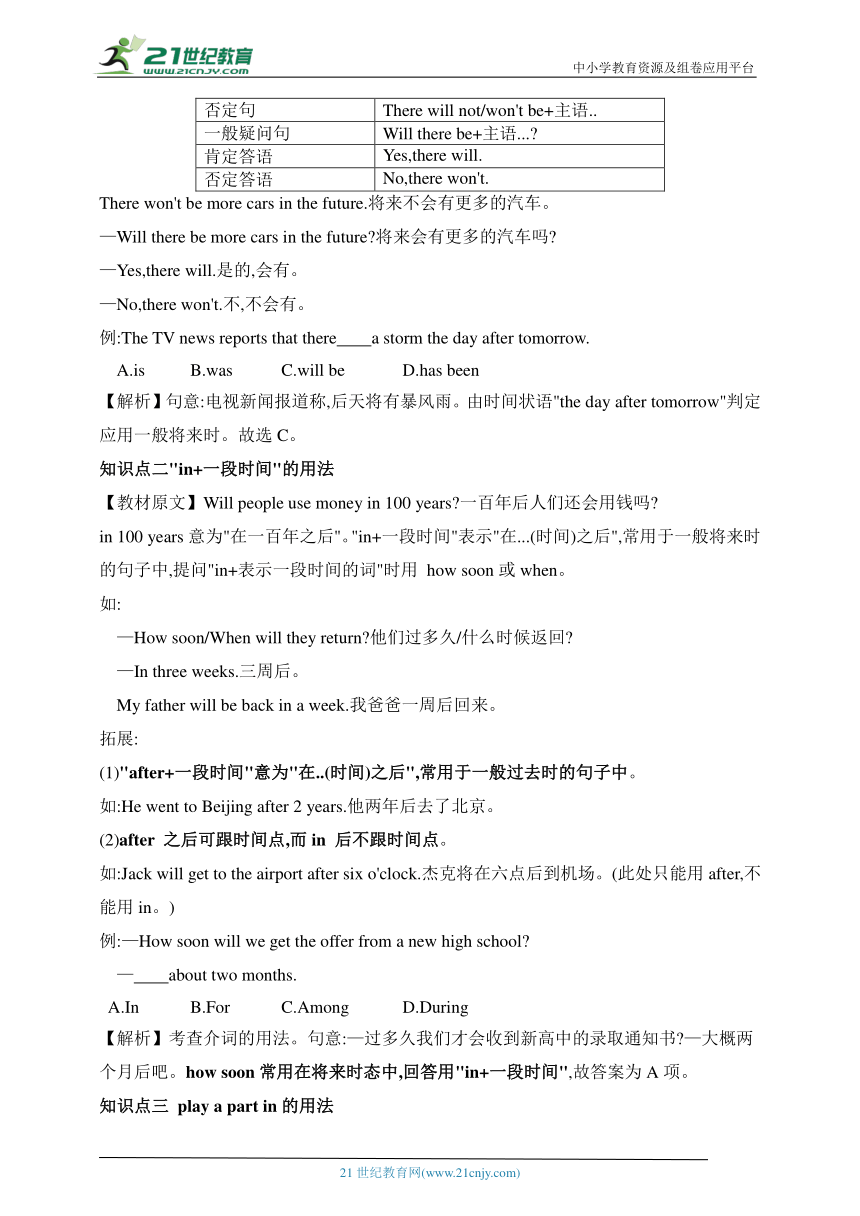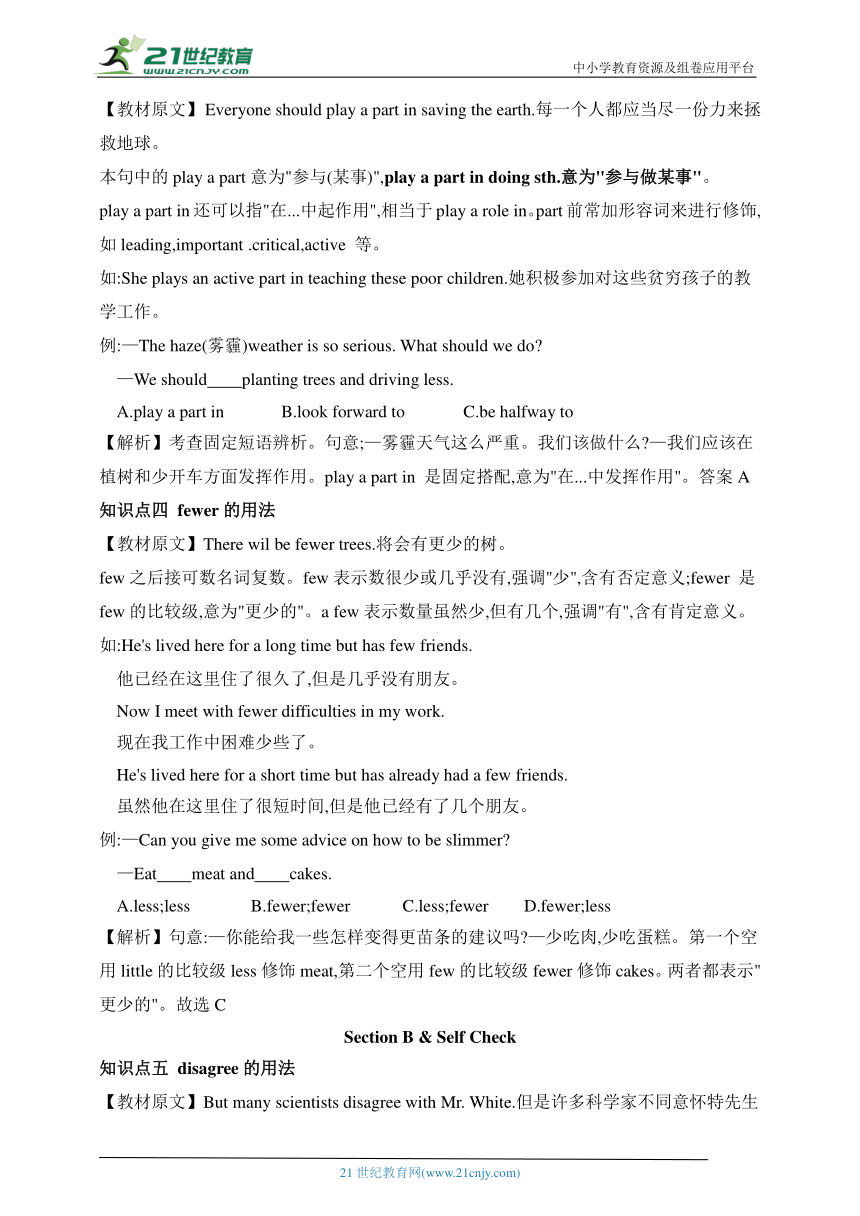【暑期核心素养培优】人教英语八上Unit 7 Will people have robots?预习学案
文档属性
| 名称 | 【暑期核心素养培优】人教英语八上Unit 7 Will people have robots?预习学案 |

|
|
| 格式 | doc | ||
| 文件大小 | 458.1KB | ||
| 资源类型 | 试卷 | ||
| 版本资源 | 人教新目标(Go for it)版 | ||
| 科目 | 英语 | ||
| 更新时间 | 2024-07-15 22:42:39 | ||
图片预览



文档简介
中小学教育资源及组卷应用平台
【暑期核心素养培优】人教英语八上
Unit 7 Will people have robots 预习学案
单元知识结构
熟悉交际话题:Life in future
牢记重点单词:paper,pollution. future,pollute,environment,planet,earth,plant part,peace,sea,build,sky, apartment,space,human,dangerous,already,factory,Japan,believe,disagree,even,agree,shape,fall,inside,possible,impossible,side,probably,during,holiday,word
掌握重点短语:in the future,disagree with,hundreds of,look for,play a part in,over and over again,fall down,in great danger,help with,for example,look like,wake up,space station,move to,free time activities
熟记重点句型:1.—Will there be world peace —Yes,I hope so.2. People won't use money.3. What will robots be like in the future 4. I think there will be more tall buildings,and there will be fewer cars and more buses.5. We never know what will happen in the future!6. Everyone should play a part in saving the earth.
理解核心语法:用will表示的一般将来时态;用more,less,fewer表示数量
单元核心素养
本单元的话题是未来的生活,涉及的学生的核心素养是文化意识中的人文情怀。本单元以未来生活为话题,通过看图填空.补全对话,阅读理解和写作等任务的设置,对学生的听,说,读,看,写等各方面进行了训练,促进了学生语言能力的发展。中考题中涉及此类话题的多为机器人,工作,学习,生活环境及个人梦想等。要通过大胆想象,合理猜测,写出未来生活的情景或变化。该话题主要涉及的时态是一般将来时,解题过程中要注意一般将来时的构成及用法。
Section A
知识点一 there will be的用法
【教材原文】Do you think there will be robots in people's home 你觉得人们家里会有机器人吗
本句中的 there will be是there be的一般将来时,结构是"There will be+主语+其他"。There be的一般将来时结构还可以是"There is/are going to be+主语+其他"。
如:There will be more flowers.将会有更多的花。
There is going to be a basketball match this afternoon.今天下午会有一场篮球比赛。
拓展:There will be 的句式变化有:
否定句 There will not/won't be+主语..
一般疑问句 Will there be+主语...
肯定答语 Yes,there will.
否定答语 No,there won't.
There won't be more cars in the future.将来不会有更多的汽车。
—Will there be more cars in the future 将来会有更多的汽车吗
—Yes,there will.是的,会有。
—No,there won't.不,不会有。
例:The TV news reports that there a storm the day after tomorrow.
A.is B.was C.will be D.has been
【解析】句意:电视新闻报道称,后天将有暴风雨。由时间状语"the day after tomorrow"判定应用一般将来时。故选C。
知识点二"in+一段时间"的用法
【教材原文】Will people use money in 100 years 一百年后人们还会用钱吗
in 100 years意为"在一百年之后"。"in+一段时间"表示"在...(时间)之后",常用于一般将来时的句子中,提问"in+表示一段时间的词"时用 how soon或when。
如:
—How soon/When will they return 他们过多久/什么时候返回
—In three weeks.三周后。
My father will be back in a week.我爸爸一周后回来。
拓展:
(1)"after+一段时间"意为"在..(时间)之后",常用于一般过去时的句子中。
如:He went to Beijing after 2 years.他两年后去了北京。
(2)after 之后可跟时间点,而in 后不跟时间点。
如:Jack will get to the airport after six o'clock.杰克将在六点后到机场。(此处只能用after,不能用in。)
例:—How soon will we get the offer from a new high school
— about two months.
A.In B.For C.Among D.During
【解析】考查介词的用法。句意:—过多久我们才会收到新高中的录取通知书 —大概两个月后吧。how soon常用在将来时态中,回答用"in+一段时间",故答案为A项。
知识点三 play a part in的用法
【教材原文】 Everyone should play a part in saving the earth.每一个人都应当尽一份力来拯救地球。
本句中的play a part意为"参与(某事)",play a part in doing sth.意为"参与做某事"。
play a part in还可以指"在...中起作用",相当于play a role in。part前常加形容词来进行修饰,如leading,important .critical,active 等。
如:She plays an active part in teaching these poor children.她积极参加对这些贫穷孩子的教学工作。
例:—The haze(雾霾)weather is so serious. What should we do
—We should planting trees and driving less.
A.play a part in B.look forward to C.be halfway to
【解析】考查固定短语辨析。句意;—雾霾天气这么严重。我们该做什么 —我们应该在植树和少开车方面发挥作用。play a part in 是固定搭配,意为"在...中发挥作用"。答案A
知识点四 fewer的用法
【教材原文】There wil be fewer trees.将会有更少的树。
few之后接可数名词复数。few表示数很少或几乎没有,强调"少",含有否定意义;fewer 是few的比较级,意为"更少的"。a few表示数量虽然少,但有几个,强调"有",含有肯定意义。
如:He's lived here for a long time but has few friends.
他已经在这里住了很久了,但是几乎没有朋友。
Now I meet with fewer difficulties in my work.
现在我工作中困难少些了。
He's lived here for a short time but has already had a few friends.
虽然他在这里住了很短时间,但是他已经有了几个朋友。
例:—Can you give me some advice on how to be slimmer
—Eat meat and cakes.
A.less;less B.fewer;fewer C.less;fewer D.fewer;less
【解析】句意:—你能给我一些怎样变得更苗条的建议吗 —少吃肉,少吃蛋糕。第一个空用little的比较级less修饰meat,第二个空用few的比较级fewer修饰cakes。两者都表示"更少的"。故选C
Section B & Self Check
知识点五 disagree的用法
【教材原文】But many scientists disagree with Mr. White.但是许多科学家不同意怀特先生(的观点)。
句中的disagree意为"不同意",其反义词是agree。其用法如下:
用法 例:句
disagree with sb.不同意某人的观点 She disagrees with me.她不同意我的观点。
disagree that... 不同意... He disagrees that I go there.他不同意我去那儿。
拓展
例:—I think we should take not only an umbrella but also a raincoat with us.
— .In my opinion,an umbrella is enough.
A.I'm OK B.I'm afraid not C.I disagree D.You're welcome
【解析】考查交际用语。句意:—我认为我们不仅应该带把伞,还应该带件雨衣。—我不同意。在我看来,一把伞就够了。I'm OK我很好;I'm afraid not 恐怕不行;I disagree我不同意;You're welcome不客气。根据答语中的"In my opinion,an umbrella is enough."可知,应该是"我不同意"。答案C
知识点六 It+takes+时间+to do sth.的用法
【教材原文】However,they agree it may take hundreds of years.然而,他们同意可能要花几百年的时间(才会有更多的机器人)的观点。
take意为"花费",其主语常是it,代替后面的动词不定式(短语)。常用句型:It takes/took/will take sb.some time to do sth.意为"某人花费一段时间做某事"。
如:It took us half an hour to cook dinner.做晚饭用了我们半个小时。
例:.It about eight minutes for the light to travel from the sun to the earth.
A.pays B.costs C.spends D.takes
【解析】考查动词辨析。句意:光从太阳到地球大约需要8分钟的时间。此处是It takes some time to do sth.的句型。pay的主语是人;cost的主语应该是物,主要用于花钱方面;spend的主语是人。故这三项都不符合。故选D。
知识点七 hundreds of 的用法
【教材原文】However,they agree it may take hundreds of years.然而,他们同意可能要花几百年的时间(才会有更多的机器人)的观点。
hundreds of意为"许多;大量;好几百的",修饰可数名词复数。类似用法的数词还有thousand, million等。具体用法如下:
(1)用单数的情况:当这些词与具体数字连用时,习惯上用单数,而且其后不接介词of。
如:I have two hundred and thirty-five books.我有235 本书。
(2)用复数的情况:当这些词不与具体数字连用,而是表示不确定的数时,则不仅要用复数,后面还要接介词 of,然后才能接名词。
如:There are hundreds of books on the desk.桌子上有几百本书。
例:In our hometown, villagers leave for big cities to look for jobs.
【解析】句意:在我们的家乡,数百名村民动身前往大城市寻找工作。表示具体数字时hundred不用复数形式;hundreds of表示约数,意思是"数百"。根据句意可知选项C符合题意。答案C
语法重点难点 一般将来时
一般将来时表示将来某个时间要发生的动作或存在的状态,也表示将来经常或反复发生的动作,常与表示将来的时间状语连用,如tomorrow.next week,next year等。
如:I will go to my hometown next week.下周我将去我的家乡。
一般将来时的构成:
1."助动词will+动词原形"结构。will在名词或代词后常简缩为"'ll",will not 常简缩为won't。在疑问句中,主语为第一人称(I和we)时,常用助动词shall。
A.two hundreds of B.hundred of C.hundreds of D.two hundreds
人称 肯定式 否定式 疑问式
第一人称 I/We will go. I/We will not go. Shall /we go
第二人称 You will go. You will not go. Will you go
第三人称 He/She/It/They will go. He/She/It/They will not go. Will he/she/it/they go
2."be going to+动词原形"表示将要发生的事或打算,计划,决定要做的事情。
如:What are you going to do next Sunday
下周日你打算做什么
They're going to meet at the school gate.
他们打算在校门口见面。
3.there be 句型的一般将来时结构:There will be...和There is/are going to be...。
如:There will be more trees in the future.
未来将有更多的树。
There is going to be a meeting in our school tomorrow.
我们学校明天将有个会议。
4.there be句型一般将来时的一般疑问句及肯定.否定回答:
Is/Are there going to be... 和Will there be... Yes,there is/are,和 Yes,there will.
No,there isn't/aren't和 No,there won't.
5.there be句型一般将来时的否定句结构:
There won't be...和 There isn't/aren't going to be....
如:There won't be any paper money in the future.未来将没有纸币。
易错易混辨析
1.cost,spend,pay与take
易混词 用法
四"花费" spend表示"花费",主语为人sb.spends some time/some money doing sth. 某人花费多少时间/金钱做某事sb.spends…on sth.某人在某物上花费……
cost表示"花费",主语为物sh.costs sb.some money某物花费基人多少钱
pay表示"支付;付钱",主语为人sb.pays some money for sth.某人为某物支付多少钱
take表示"花费",主语为形式主语it或物It takes sb.some time to do sth. 做某事花费某人多长时间
2.space,room与place
space 指空间,太空时是不可数名词;指大片空地,开阔地时,可以作可数名词,也可以作不可数名词
room 指为某一目的所需的空间,侧重大小,尺寸等,是不可数名词。room 泛指一般意义的"空地"或"空间"
place 指某人或某物所占的特定的空间,是可数名词。其含义通常比较具体,且指座位时,与seat同义
3.in,after与later
词汇 用法 示例:
in "in+时间段"表示"从现在开始算起的一段时间以后",也可以表示"在将来多少时间之内"。句中谓语动词通常用一般将来时。 He will be back in two days.他两天后回来。
after "after+一段时间"以过去为起点,表示过去一段时间以后,常用于过去时中。"after+具体时刻/具体事件"表示在某一具体时间点或某一具体事件以后,既可与过去时连用,也可用于将来时。 He went home after two days.他两天后回家了。
later later一般用于一段时间之后,即"一段时间+later",相当于"after+一段时间",多用于一般过去时。 Three years later,she went to Tsinghua University.三年后,她上了清华大学。
HYPERLINK "http://21世纪教育网(www.21cnjy.com)
" 21世纪教育网(www.21cnjy.com)
【暑期核心素养培优】人教英语八上
Unit 7 Will people have robots 预习学案
单元知识结构
熟悉交际话题:Life in future
牢记重点单词:paper,pollution. future,pollute,environment,planet,earth,plant part,peace,sea,build,sky, apartment,space,human,dangerous,already,factory,Japan,believe,disagree,even,agree,shape,fall,inside,possible,impossible,side,probably,during,holiday,word
掌握重点短语:in the future,disagree with,hundreds of,look for,play a part in,over and over again,fall down,in great danger,help with,for example,look like,wake up,space station,move to,free time activities
熟记重点句型:1.—Will there be world peace —Yes,I hope so.2. People won't use money.3. What will robots be like in the future 4. I think there will be more tall buildings,and there will be fewer cars and more buses.5. We never know what will happen in the future!6. Everyone should play a part in saving the earth.
理解核心语法:用will表示的一般将来时态;用more,less,fewer表示数量
单元核心素养
本单元的话题是未来的生活,涉及的学生的核心素养是文化意识中的人文情怀。本单元以未来生活为话题,通过看图填空.补全对话,阅读理解和写作等任务的设置,对学生的听,说,读,看,写等各方面进行了训练,促进了学生语言能力的发展。中考题中涉及此类话题的多为机器人,工作,学习,生活环境及个人梦想等。要通过大胆想象,合理猜测,写出未来生活的情景或变化。该话题主要涉及的时态是一般将来时,解题过程中要注意一般将来时的构成及用法。
Section A
知识点一 there will be的用法
【教材原文】Do you think there will be robots in people's home 你觉得人们家里会有机器人吗
本句中的 there will be是there be的一般将来时,结构是"There will be+主语+其他"。There be的一般将来时结构还可以是"There is/are going to be+主语+其他"。
如:There will be more flowers.将会有更多的花。
There is going to be a basketball match this afternoon.今天下午会有一场篮球比赛。
拓展:There will be 的句式变化有:
否定句 There will not/won't be+主语..
一般疑问句 Will there be+主语...
肯定答语 Yes,there will.
否定答语 No,there won't.
There won't be more cars in the future.将来不会有更多的汽车。
—Will there be more cars in the future 将来会有更多的汽车吗
—Yes,there will.是的,会有。
—No,there won't.不,不会有。
例:The TV news reports that there a storm the day after tomorrow.
A.is B.was C.will be D.has been
【解析】句意:电视新闻报道称,后天将有暴风雨。由时间状语"the day after tomorrow"判定应用一般将来时。故选C。
知识点二"in+一段时间"的用法
【教材原文】Will people use money in 100 years 一百年后人们还会用钱吗
in 100 years意为"在一百年之后"。"in+一段时间"表示"在...(时间)之后",常用于一般将来时的句子中,提问"in+表示一段时间的词"时用 how soon或when。
如:
—How soon/When will they return 他们过多久/什么时候返回
—In three weeks.三周后。
My father will be back in a week.我爸爸一周后回来。
拓展:
(1)"after+一段时间"意为"在..(时间)之后",常用于一般过去时的句子中。
如:He went to Beijing after 2 years.他两年后去了北京。
(2)after 之后可跟时间点,而in 后不跟时间点。
如:Jack will get to the airport after six o'clock.杰克将在六点后到机场。(此处只能用after,不能用in。)
例:—How soon will we get the offer from a new high school
— about two months.
A.In B.For C.Among D.During
【解析】考查介词的用法。句意:—过多久我们才会收到新高中的录取通知书 —大概两个月后吧。how soon常用在将来时态中,回答用"in+一段时间",故答案为A项。
知识点三 play a part in的用法
【教材原文】 Everyone should play a part in saving the earth.每一个人都应当尽一份力来拯救地球。
本句中的play a part意为"参与(某事)",play a part in doing sth.意为"参与做某事"。
play a part in还可以指"在...中起作用",相当于play a role in。part前常加形容词来进行修饰,如leading,important .critical,active 等。
如:She plays an active part in teaching these poor children.她积极参加对这些贫穷孩子的教学工作。
例:—The haze(雾霾)weather is so serious. What should we do
—We should planting trees and driving less.
A.play a part in B.look forward to C.be halfway to
【解析】考查固定短语辨析。句意;—雾霾天气这么严重。我们该做什么 —我们应该在植树和少开车方面发挥作用。play a part in 是固定搭配,意为"在...中发挥作用"。答案A
知识点四 fewer的用法
【教材原文】There wil be fewer trees.将会有更少的树。
few之后接可数名词复数。few表示数很少或几乎没有,强调"少",含有否定意义;fewer 是few的比较级,意为"更少的"。a few表示数量虽然少,但有几个,强调"有",含有肯定意义。
如:He's lived here for a long time but has few friends.
他已经在这里住了很久了,但是几乎没有朋友。
Now I meet with fewer difficulties in my work.
现在我工作中困难少些了。
He's lived here for a short time but has already had a few friends.
虽然他在这里住了很短时间,但是他已经有了几个朋友。
例:—Can you give me some advice on how to be slimmer
—Eat meat and cakes.
A.less;less B.fewer;fewer C.less;fewer D.fewer;less
【解析】句意:—你能给我一些怎样变得更苗条的建议吗 —少吃肉,少吃蛋糕。第一个空用little的比较级less修饰meat,第二个空用few的比较级fewer修饰cakes。两者都表示"更少的"。故选C
Section B & Self Check
知识点五 disagree的用法
【教材原文】But many scientists disagree with Mr. White.但是许多科学家不同意怀特先生(的观点)。
句中的disagree意为"不同意",其反义词是agree。其用法如下:
用法 例:句
disagree with sb.不同意某人的观点 She disagrees with me.她不同意我的观点。
disagree that... 不同意... He disagrees that I go there.他不同意我去那儿。
拓展
例:—I think we should take not only an umbrella but also a raincoat with us.
— .In my opinion,an umbrella is enough.
A.I'm OK B.I'm afraid not C.I disagree D.You're welcome
【解析】考查交际用语。句意:—我认为我们不仅应该带把伞,还应该带件雨衣。—我不同意。在我看来,一把伞就够了。I'm OK我很好;I'm afraid not 恐怕不行;I disagree我不同意;You're welcome不客气。根据答语中的"In my opinion,an umbrella is enough."可知,应该是"我不同意"。答案C
知识点六 It+takes+时间+to do sth.的用法
【教材原文】However,they agree it may take hundreds of years.然而,他们同意可能要花几百年的时间(才会有更多的机器人)的观点。
take意为"花费",其主语常是it,代替后面的动词不定式(短语)。常用句型:It takes/took/will take sb.some time to do sth.意为"某人花费一段时间做某事"。
如:It took us half an hour to cook dinner.做晚饭用了我们半个小时。
例:.It about eight minutes for the light to travel from the sun to the earth.
A.pays B.costs C.spends D.takes
【解析】考查动词辨析。句意:光从太阳到地球大约需要8分钟的时间。此处是It takes some time to do sth.的句型。pay的主语是人;cost的主语应该是物,主要用于花钱方面;spend的主语是人。故这三项都不符合。故选D。
知识点七 hundreds of 的用法
【教材原文】However,they agree it may take hundreds of years.然而,他们同意可能要花几百年的时间(才会有更多的机器人)的观点。
hundreds of意为"许多;大量;好几百的",修饰可数名词复数。类似用法的数词还有thousand, million等。具体用法如下:
(1)用单数的情况:当这些词与具体数字连用时,习惯上用单数,而且其后不接介词of。
如:I have two hundred and thirty-five books.我有235 本书。
(2)用复数的情况:当这些词不与具体数字连用,而是表示不确定的数时,则不仅要用复数,后面还要接介词 of,然后才能接名词。
如:There are hundreds of books on the desk.桌子上有几百本书。
例:In our hometown, villagers leave for big cities to look for jobs.
【解析】句意:在我们的家乡,数百名村民动身前往大城市寻找工作。表示具体数字时hundred不用复数形式;hundreds of表示约数,意思是"数百"。根据句意可知选项C符合题意。答案C
语法重点难点 一般将来时
一般将来时表示将来某个时间要发生的动作或存在的状态,也表示将来经常或反复发生的动作,常与表示将来的时间状语连用,如tomorrow.next week,next year等。
如:I will go to my hometown next week.下周我将去我的家乡。
一般将来时的构成:
1."助动词will+动词原形"结构。will在名词或代词后常简缩为"'ll",will not 常简缩为won't。在疑问句中,主语为第一人称(I和we)时,常用助动词shall。
A.two hundreds of B.hundred of C.hundreds of D.two hundreds
人称 肯定式 否定式 疑问式
第一人称 I/We will go. I/We will not go. Shall /we go
第二人称 You will go. You will not go. Will you go
第三人称 He/She/It/They will go. He/She/It/They will not go. Will he/she/it/they go
2."be going to+动词原形"表示将要发生的事或打算,计划,决定要做的事情。
如:What are you going to do next Sunday
下周日你打算做什么
They're going to meet at the school gate.
他们打算在校门口见面。
3.there be 句型的一般将来时结构:There will be...和There is/are going to be...。
如:There will be more trees in the future.
未来将有更多的树。
There is going to be a meeting in our school tomorrow.
我们学校明天将有个会议。
4.there be句型一般将来时的一般疑问句及肯定.否定回答:
Is/Are there going to be... 和Will there be... Yes,there is/are,和 Yes,there will.
No,there isn't/aren't和 No,there won't.
5.there be句型一般将来时的否定句结构:
There won't be...和 There isn't/aren't going to be....
如:There won't be any paper money in the future.未来将没有纸币。
易错易混辨析
1.cost,spend,pay与take
易混词 用法
四"花费" spend表示"花费",主语为人sb.spends some time/some money doing sth. 某人花费多少时间/金钱做某事sb.spends…on sth.某人在某物上花费……
cost表示"花费",主语为物sh.costs sb.some money某物花费基人多少钱
pay表示"支付;付钱",主语为人sb.pays some money for sth.某人为某物支付多少钱
take表示"花费",主语为形式主语it或物It takes sb.some time to do sth. 做某事花费某人多长时间
2.space,room与place
space 指空间,太空时是不可数名词;指大片空地,开阔地时,可以作可数名词,也可以作不可数名词
room 指为某一目的所需的空间,侧重大小,尺寸等,是不可数名词。room 泛指一般意义的"空地"或"空间"
place 指某人或某物所占的特定的空间,是可数名词。其含义通常比较具体,且指座位时,与seat同义
3.in,after与later
词汇 用法 示例:
in "in+时间段"表示"从现在开始算起的一段时间以后",也可以表示"在将来多少时间之内"。句中谓语动词通常用一般将来时。 He will be back in two days.他两天后回来。
after "after+一段时间"以过去为起点,表示过去一段时间以后,常用于过去时中。"after+具体时刻/具体事件"表示在某一具体时间点或某一具体事件以后,既可与过去时连用,也可用于将来时。 He went home after two days.他两天后回家了。
later later一般用于一段时间之后,即"一段时间+later",相当于"after+一段时间",多用于一般过去时。 Three years later,she went to Tsinghua University.三年后,她上了清华大学。
HYPERLINK "http://21世纪教育网(www.21cnjy.com)
" 21世纪教育网(www.21cnjy.com)
同课章节目录
